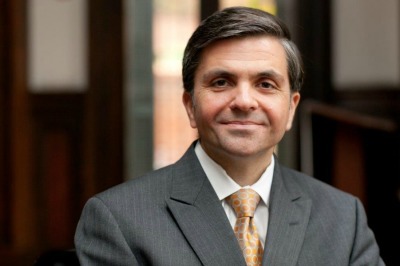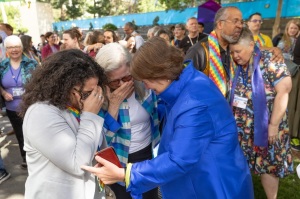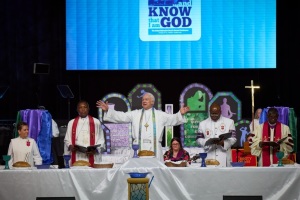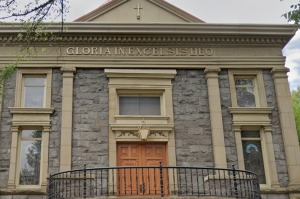Christian Zionism & Anti-Zionism
Below are my remarks at the April 17 conference "People of the Land: A 21st Century Case for Christian Zionism."

A unlikely founder of American Christian Zionism was a zealous Methodist preacher and business man named William Blackstone, who was a Dispensationalist and Restorationist. Although strange now, it was a natural stretch in the mid 19th century, when Mainline Protestants commonly assumed Providential attention for nations and people groups, above all the American people, who were a sort of prototype of New Zion. Methodists with their fixation on constant moral reform had a natural affinity for outreach to the long displaced and frequently tormented Jewish people.
In 1890 Blackstone hosted a "Conference on the Past, Present and Future of Israel" at Chicago's First Methodist Episcopal Church, where church leaders and others implored the great powers, above all the Ottomans as custodians of the Holy Land, to return the Jews to their ancient homeland. In 1891 he launched the Blackstone Memorial urging American support for a Jewish homeland in Palestine, aimed at President Benjamin Harrison, an observant Presbyterian, and which was signed by hundreds of notables, including soon to be President William McKinley, a devout Methodist, and business moguls like John D. Rockefeller, J.P. Morgan, Cyrus McCormick, who were respectively Northern Baptist, Episcopal and Presbyterian.
Blackstone's letter to President Harrison explained: "There seem to be many evidences to show that we have reached the period in the great roll of centuries, when the everlasting God of Abraham, Isaac and Jacob, is lifting up His hand to the Gentiles (Isaiah 49:22) to bring His sons and his daughters from far, that he may plant them again in their own land, Ezekiel 34, etc. Not for twenty-four centuries, since the days of Cyrus, King of Persia, has there been offered to any mortal such a privileged opportunity to further the purposes of God concerning His ancient people."
The movement founded by Blackstone did not appreciably advance except that adherents often spoke on behalf of persecuted Jews, especially victims of pogroms in Russia. In 1916 Jewish leaders successfully urged Blackstone to revive his Memorial, this time for another Presbyterian President, Woodrow Wilson, even gaining official Presbyterian Church support in the private appeal, which was believed to influence the Administration to support Britain's Balfour Declaration.
Blackstone's Zionism comfortably melded with wider Mainline Protestant interpretations of WWI as a divine instrument for chastening and reforming the nations, pushing them in the direction of God's ultimate Kingdom. Bishop Samuel Spreng preached on the war's lessons in the summer of 1918 to the Oakwood Park Assembly outside Chicago. He was a bishop in The Evangelical Church, a denomination in which Orville and Wilbur Wright's father was also a bishop, and which would decades later merge into The United Methodist Church.
The "cataclysm" of world war had brought suffering but also a "new birth," Bishop Spreng promised. "Above the battle's roar, and the cannon's thunder one can hear the voice of the Almighty saying, 'Behold I make all things new.'" He pronounced the war as a judgment upon the world and was confident that God, never intending that "one man should rule the world," would ensure that Germany's "war lord would fail too," with Germany ultimately freed from the "tyrant's yoke." Bishop Spreng celebrated the fall of Russia's czar and the "tyranny of the Greek Church," leaving Russia "now ready for the Gospel." Speaking before the Bolshevik takeover in a few months, he enthused that Russia is "religiously free as a direct result of the war," and "this alone is worth all that the war has as yet cost in blood and life and treasure." He also rejoiced that with the fall of Turkey, the "political significance of Islam will be broken." Spreng foresaw that "Mohammedan lands will be open to the Gospel as never before." Thanks to British arms, the "flag of a Christian nation" now floats above Jerusalem. Britain had promised a homeland for the Jews, which the Bishop saw as one of God's "miracles" emerging from the war. "War is the surgeon's knife in God's hand for the purpose of delivering the nations from their imperiling sins," Spreng suggested, adding that "Jehovah is a man of war." And this war is the "thunder and crash of the irresistible march of progress."
Christian Zionism continued after WWI in groups like the now to us ironically named "Pro-Palestine Federation," which organized church leaders for Jewish return to Zion. In 1936 the group, including the Episcopal Bishop of Washington among other prominent Mainliners, met the British ambassador, while claiming to represent 'the consensus of enlightened Christian American opinion," to remind the British government that "God has bestowed upon England one of the greatest missions in human history – the salvation of Israel and restoration to its ancient patrimony'. Also participating was liberal Methodist Bishop Francis J. McConnell, a founder of the Methodist Federation for Social Action, now today a leading proponent of anti-Israel divestment, but who in the 1930s was urging Britain 'to fulfill its convenental pledges" about a Jewish homeland in Palestine.
In the late 1930s a similar group, with some of the same church voices, arose, called "Christian Leaders, Clergymen and Laymen, on Behalf of Jewish Immigration into Palestine Federation," declaring that "the destiny of the Jews is a matter of immediate concern to the Christian conscience, the amelioration of their lot a duty that rests upon all that profess Christian principles." Joining prelates like Bishop McConnell was an increasingly prominent German Reformed theologian at New York's Union Seminary named Reinhold Niebuhr. This group was "committed to the establishment of a Jewish commonwealth in Palestine in relation to the overall settlement in the postwar era," while "urg[ing] as immediate policy the admission now of Jewish exiles into other countries, including the United States, as well as Palestine." One of its seminary leaders, a Congregationalist, confidently exclaimed that, "As soon as the British see that list of men on our stationery – Niebuhr, Tillich, McConnell, Albright, Sockman, and Poling – they'll open the gates of Palestine and let those Jewish refugees come pouring in. Then we'll disband the committee. It's as simple as that."
Niebuhr wrote describing the group's purpose:
The Jews require a homeland, if for no other reason, because even the most generous immigration laws of Western democracies will not permit all the dispossessed Jews of Europe to find a haven in which they may look forward to a tolerable future … Whether the Jews will be allowed to develop a genuine homeland under their own sovereignty within the framework of the British Empire depends solely upon the amount of support that they secure in the two great democracies, for those democracies will have it in their power if Hitler is defeated to make the necessary political arrangements … The Anglo-Saxon hegemony that is bound to exist in the event of an Axis defeat will be in a position to see to it that Palestine is set aside for the Jews, that the present restrictions on immigration are abrogated, and that the Arabs are otherwise compensated.
As one author noted, the prominent Mainline Protestant Zionists by this time were no longer speaking theologically but in terms of earthly political justice. It was said that liberal sophisticates like Niebuhr thought Christian so-called fundamentalists were correct on Zionism only inadvertently.
In 1958 Niebuhr wrote:
Many Christians are pro-Zionist in the sense that they believe that a homeless people require a homeland; but we feel as embarrassed as anti-Zionist religious Jews when messianic claims are used to substantiate the right of the Jews to the particular homeland in Palestine … History is full of strange configurations. Among them is the thrilling emergence of the State of Israel.
Liberal Protestants in the early post WWII years agreed mostly with Niebuhr. New York Methodism in 1948 commended President Harry Truman for recognizing Israel and urged the United Nations to treat attacking Arab states as a "threat to world peace." New York Bishop G. Bromley Oxnam was presented an award for honoring newly formed Israel's "stand for dignity and equality of opportunity."
In 1954, Missouri Bishop Ivan Holt of the World Methodist Council and another bishop joined prominent officials in urging Arab states to resettle 800,000 Arab (i.e., Palestinian) refugees from the 1948 war. Of the Palestinians, they declared: "Led into flight from their homes by Arab leaders, they are prevented from seeking permanent rehabilitation by these same leaders who use existence of the problem as a weapon against the West and against Israel."
By the 1970s, Mainline Protestantism, no longer seeing Israel as the underdog after the 1967 victory, and increasingly enthralled by Liberation Theology, which assumed Western nations like Israel were de facto oppressors of Third World peoples, was shifting against Zionism. Liberal Protestant pronouncements reacting to the 1973 war were ambivalent. Declared one official:




























